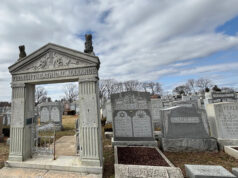 Tel Aviv was founded on April 11, 1909. Several dozen families gathered on the beach outside of the city of Yaffa to allocate plots of land for a new neighborhood they called Ahuzat Bayit (Homestead), later it became known as Tel Aviv (Hill of Spring). In Hebrew, Tel does not simply mean hill, but a man made hill covering the remains of an ancient settlement or a hill in an archeological excavation. And the word aviv means spring. Therefore, the name Tel Aviv stands for a link between old and new; antiquity rejuvenated. This is the concept on which the city of Tel Aviv was founded.
Tel Aviv was founded on April 11, 1909. Several dozen families gathered on the beach outside of the city of Yaffa to allocate plots of land for a new neighborhood they called Ahuzat Bayit (Homestead), later it became known as Tel Aviv (Hill of Spring). In Hebrew, Tel does not simply mean hill, but a man made hill covering the remains of an ancient settlement or a hill in an archeological excavation. And the word aviv means spring. Therefore, the name Tel Aviv stands for a link between old and new; antiquity rejuvenated. This is the concept on which the city of Tel Aviv was founded.
The city expanded rapidly, with massive waves of immigration in the 1920s and 30s. Tel Avivs status as the regions most creative, liberal and tolerant city was furthered when it merged with Yaffa in 1950.
Throughout the decades, the city has flourished to become Israels business and cultural center and has developed a unique atmosphere fusing Mediterranean and urban elements. A little over one hundred years after it was founded, Tel Aviv-Yaffa is a thriving city.
Whats most important about Tel-Aviv is that it was the first all Jewish city, where Jews governed themselves since the destruction of Israel by the Romans 1,900 years before.
While Tel Aviv is relatively new, Jaffa may be the oldest city in Israel. Legend has it that it was founded by Japheth, one of Noahs sons. Jaffa was the port used by King Solomon to bring the cedars of Lebanon to Israel for constructing the first Temple.
In 1921 the Arabs of Jaffa attacked the small Jewish community there so that all of the Jews that lived there moved to Tel Aviv. Consequently Tel Aviv achieved a population of 45,000. Twenty years later, in 1941, the population of Tel Aviv grew immensely, again, as refugees from Nazi occupied Europe moved there.
When David ben Gurion proclaimed the re-establishment of Israeli independence on May 5, 1948, Tel Aviv was declared the capital of Israel. A year later, the capital was moved to the City of David, in Jerusalem, which had been the capital of Israel for over 1,000 years.
Today, Tel Aviv has the highest standard of living of any city in Israel. Its the commercial and financial center of the country and the industrial center of Israel, where textiles, clothing, motor vehicles and electronic equipment are produced.
The Stock Exchange and the Diamond Exchange are located there, as is the Israel Philharmonic Orchestra. From 1965 to 1999, Israels first skyscraper, the Shalom Meir Tower, was the countrys tallest building. The current tallest building in Tel Aviv is the Azrieli Center Circular, one of the three buildings that make up the Azrieli Center.
Tel Aviv, is home to several museums, including the Eretz Israel Museum. Located in North Tel Aviv, the museum is unique in both character and structure: it might be called a Museum Park comprising many exhibition pavilions and a huge campus. Every pavilion is dedicated to a different cultural subject, including archaeology and Judaica. The National Museum of Natural History is also located in Tel Aviv at Tel Aviv University. Israel is the only scientific center in the entire Middle East where intensive collecting, research, and teaching in the natural sciences take place, so these collections are priceless and irreplaceable.
The history of Israel and Europe has greatly influenced the character of Tel Aviv. It has established itself as a metropolitan area, with its very own style and characteristic way of life. Stop by on your next trip to Israel and see all that it has to offer.


